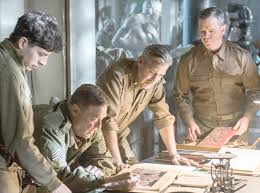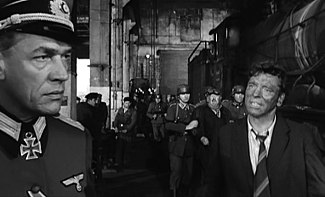An alternative to the Great British Hero.
- ronnierennoldson
- Aug 31, 2022
- 3 min read
With the bank holiday weekend over, I remain astonished at the amount of war films shown on Freeview television but not surprised, given the obsession the English have with beating Germany at anything (meanwhile rewriting history to ignore anyone else that might have helped).
The nationalist fanaticism stoked by the repeated glorification of such victories does nothing to heal old wounds and ultimately leads to the divisiveness that we now experience with Europe branded as restrictive and refugees as undesirables. However, among the jingoism on display over the weekend were two films (often repeated) that stand out and offer an alternative to the Great British Hero and they made me wonder where art is currently positioned in our culture, how valuable it is to us, and what we would sacrifice for it.
The films were The Train, 1964, directed by John Frankenheimer and starring Burt Lancaster and Paul Scofield. The other film was The Monuments Men, 2014, directed by George Clooney, starring George Clooney, co-written by George Clooney and co-produced by George Clooney (with Grant Heslov ) and while both are works of fiction they are based on a reality: a reality where Art and cultural icons are considered both dangerous and valuable at the same time and where people are prepared to sacrifice their lives to retain them.
scene from Monuments Men scene from The Train
It’s clear, given the devastation wreaked by successive victors of wars on monuments and cultural references, that art is seen as a dangerous support system to cultural identity. The so-called Islamic state or Daesh militia destroyed 70% of Nineveh, (dating from the 7th Century BCE) and made it a policy to destroy any evidence of a culture not in accord with their own views. The Nazi regime ordered the destruction of thousands of pieces of art from what they referred to as "inferior cultures” or that they considered degenerate. The destruction of the Mostar Bridge in Sarajevo during the Bosnian war was considered a deliberate act of cultural destruction, an act of "killing memory" and even in the UK, over 90% of religious art was destroyed during the reformation and the English civil war in the 1640s, yet our understanding of that period of our history survives because of the remaining 10%. Killing memory is quite difficult
Being an artist is a poorly paid career choice with most artists living below a living wage, yet many people are drawn to it (the creative industries generate £100bn annually in the UK), producing work that will be seen by only a few or by social media followers who have already bought into their vision. Governments use periods of austerity as a device to starve any endeavour that does not support GDP or support their understanding of what culture is so will prop up the mainstream, and thereby control the output of those arts
Recent governments have created a society where students are forced into unpaid internships in the hope of a career to pay-off crippling debt, where artists struggle to develop their work because studios are being pushed out of city centres, where musicians have to fight technology to get paid and where architects are reduced to designers of wallpaper for a construction industry that just wants a “decorated shed”. Despite these circumstances, the arts retreat for a while, respond to circumstances and reinvent themselves by thinking more deeply and using resources more carefully in the knowledge that only 10% of output is needed to define us. Fortunately, a huge proportion of our current output can be consigned to the scrap heap, not worthy of any sacrifice.
Although we have critical issues surrounding climate change, and our future will judge us by how we respond to that, future monuments will come from our current output, from a place and from artists that we don’t recognise yet. There is already some fabulous work to choose from, but what we can be certain of is that we need more art, better art and that art, in all its forms, should be properly supported, funded and respected, But most of all it needs time; Time to develop, time to innovate, time to consolidate and time to infiltrate the mainstream. Our future will judge us by it but the time we need will not be given without us fighting for it now and if we dont, given the way our current government view the Arts ,there will be nothing left to fight for.
"I sink i saw sumsink" a classic understatement and timely reminder not to avoid the obvious from The Train 1964


